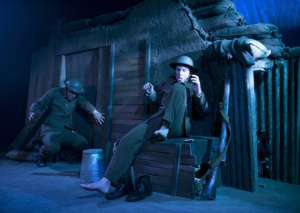“Theirs not to reason why, / Theirs but to do and die.” So wrote English poet Alfred Tennyson in the second stanza of his famous poem The Charge of the Light Brigade about the ill-fated Battle of Balaclava during the Crimean War in which miscommunication led to almost 300 British soldiers being killed, wounded or taken prisoner.
And so said Edinburgh miner Johnny Duthie (not Duffy, “th as in thick”) to his fellow Jambo workmate and best friend from childhood Peter (p as in “pigging”, his derogatory adjective of choice to describe rivals Hibernian, Johnny Foreigner and in particular the “dodgy Serbs”) before following a handful of their beloved Heart of Midlothian footballers in joining the 16th Battalion of the Royal Scots to fight in the Battle of the Somme – one of the bloodiest wars in history in which the British forces suffered 19,240 fatalities on the first day. Ironically, almost as many people as crammed into Tynecastle after its new stand opened in 1914.
Weaving together three time zones – pre-war banter between the underage and overkeen miners (played with great heart and humour by Patrick Wallace and Scott Hoatson), the horror and confusion of war as experienced by those who “do and die”, and its bloody aftermath in which a shell-shocked Johnny follows his eponymous legs “and keeps on walking” until he finds refuge in the farmhouse of a French widow (Belle Jones) with whom he develops an intimate relationship – writer and director Iain Johnstone (who also plays a conveyor belt of fine cameos) successfully marries fact with fiction, hope with horror, to great effect.

Billed as a “celebration of human resilience”, which brings alive “the enormity of this first global conflict for a new generation of young people”, its little surprise that Wee Stories in association with Fife Cultural Trust have chosen to utilise inventive and comical means to tackle what is a dense and depressing chapter in British military history, but the lengthy scenes involving chicken puppets particularly towards the end of Act 1 are (pardon the pun) over-egged.
Not an accusation, which can be levelled at a delightful scene earlier in the play between Johnny and Peter in which the former delivers a potted history of the background to the First World War using a selection of plates and saucers. But where the production really hits home is when it tugs at the heart strings and engages with our emotions: first, in the tender relationship between Johnny and his French landlady who lost her husband in the same bloody battle; and secondly, and most powerfully, and movingly of all, when the teenagers drop their masks of masculinity to express their fears about their fate and their obvious affection for one another.
Two young men from Edinburgh left for war, but only one returned. But the abiding message behind Iain Johnstone’s play is not one of sadness and despair, but hope and resilience. And, above all, a celebration of friendship. Or as Alfred Tennyson more eloquently put it in his poem In Memorium about the sudden loss of his close friend and fellow poet Arthur Hallam: “Tis better to have loved and lost / Than never to have loved at all.”
- REVIEW: Orphans @ Edinburgh King’s Theatre ⭐⭐⭐⭐ - 13th April 2022
- REVIEW: Everybody’s Talking About Jamie @ Edinburgh Festival Theatre ⭐⭐⭐⭐ - 30th March 2022
- REVIEW: Sheila’s Island @ Edinburgh King’s Theatre - 2nd March 2022
